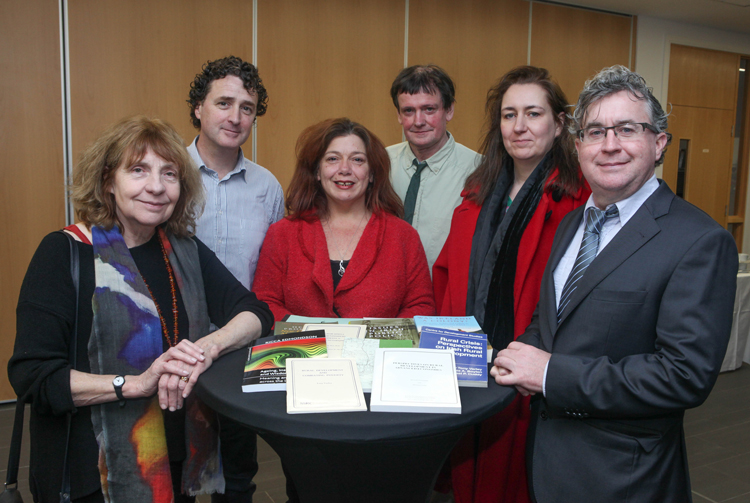Social Science Research Centre
Social Science Research Centre

http://www.nuigalway.ie/camps/
Leader: Dr. Tony Varley
Members:
Dr Anne Byrne (School of Political Science and Sociology)
Dr Mary Cawley (School of Geography and Archaeology)
Dr Nessa Cronin (Centre for Irish Studies)
Dr Ricca Edmondson (School of Political Science and Sociology)
Dr Mark Elliott (School of Psychology)
Dr Mark Haugaard (School of Political Science and Sociology)
Mr Jonathan Heaney (School of Political Science and Sociology)
Prof. Terry McDonough (Department of Economics)
Dr Saoirse Nic Gabhainn (Discipline of Health Promotion)
Dr Kevin Ryan (School of Political Science and Sociology)
Prof. Ulf Strohmayer (School of Geography and Archaeology)
Dr Tony Varley (School of Political Science and Sociology)
Dr Eilís Ward (School of Political Science and Sociology)
Description:
This Centre takes forward a powerful interdisciplinary research focus centring on the interactions between culture and power, and their effects on both human lifetimes and large-scale social formations. This focus utilizes major insights from Critical Theory and develops them in relation to local as well as global issues and problems. Its major research questions include the following:
1.Culture, Politics and Power
What forms of domination, and what forms of both positive and negative power, are shaping human development in the contemporary world? This topic explores theories and evidence bringing into focus both new and perennial forms of power that illuminate relations between individual agency and social systems. It deals with new forms of identity, governmentality and social order; ‘power over’ and ‘power to’; inclusion and exclusion and their relations to new social discourses; emotions and emotional regulation; and democracy, citizenship and the lifecourse, which is a concern stretching from the organization of children’s play to the social standing of older people. These foci extend to human rights at one end of the spectrum, and physical and mental health at the other.
Globalisation, Location and Dislocation
Structural strains in the contemporary world need to be explored from the point of view of political economy, in terms of both historical and novel regimes of accumulation; they also stretch right down to the intimate sphere, as evidenced by new patterns of prostitution and sex trafficking, as well as transformations in child-rearing and gendered social participation. This topic throws light on processes in which life-worlds are invaded by assumptions and practices from politically and economically dominant fields. Hence, issues surrounding the interrelations between education and development are also of central relevance.
Patterns of Power and Reasoning: Interculturality and Wisdom
This topic focuses on respects in which reasoning is an integral part of social, cultural and political structures – and interrogates the extent to which it can still function in independently critical ways. Topics include exploring the history, conceptual range and contemporary understanding of ‘wisdom’, once considered the highest possible form of human reasoning and the pinnacle of both individual and social life-courses. To what extent can wisdom offer robust critical standards for assessing contemporary decision-making, and what role does it play in the development of individual life-courses? This topic also includes the exploration of cosmopolitanism and Buddhist social theory as applied in the context of normative international relations theory. Is it possible to offer a reconceptualization of peace, incorporating traditions emphasizing compassion on the one hand and preoccupation with wisdom on the other?
Culture, Politics and Life in the Landscape
This topic focuses on community development and agrarian politics, not least the issues of populism and local development in Ireland, the smallholder question and Muintir na Tíre, and sustainable forms of democratic participation in rural settings. It also focuses on the social and economic
development of the landscape itself and the types of lifecourse that are lived in both Irish and other rural settings. This focus includes an exploration of psychological structures including artistic symbols produced in the landscape, sacral and locally-valued forms of landscape, and environment and ritual. We are particularly interested too in democratic forms of local planning, and in cultural variations in forms of inhabiting landscapes, with their physical effects. This is complemented by research into relations between urban design and civic spacesin promoting or obstructing effective forms of civil society.
Status: On-going

